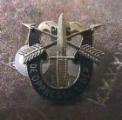I actually suspect that the Muslim Brotherhood would be the primary beneficiary of a repressive military dictatorship. Moderate opposition would be stifled, and the Brothers are used to operating underground. It would take them a while to do it, but they would very likely emerge as the sole organized opposition to an unpopular and unsustainable government. As yu say, the Brotherhood is not in a position to impose an Islamic State right now... but if they are the primary lever in toppling a new dictatorship, they would be.







Bookmarks